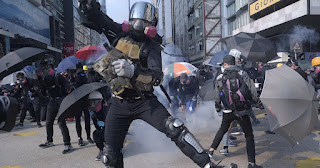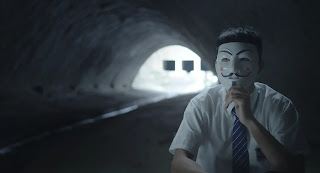 |
| Behind the scenes of the 2019 protests |
My friend YTSL told me that the documentary about the 2019 protests, Revolution of Our Times by director Kiwi Chow would be shown in Vancouver and I saw one of the last screenings this afternoon.
When I bought the ticket there were still many available, but that's because it was shown in February, and also a few times in the past two weeks.
Nevertheless it was heartening to see one of the attendees was an older woman in her 60s wearing a yellow raincoat, in reference to Marco Leung Ling-kit, who plunged to his death on June 15, 2019. The cinema was not full, but the vast majority were Asian.
The documentary in general is a good record of what happened in 2019 from the perspective the protestors; it is quite obvious from the footage there was police brutality, which demonstrates how violence escalated in the ensuing months.
 |
| Protestors were faceless and leaderless |
One of the first scenes was of former legislator Claudia Mo Man-ching taking part in the initial peaceful protests -- it would be the first of several times I would cry because she is now languishing in jail, and many other people who are captured in the film are behind bars as well.
It is very lucky of the director to have interviewed them for the record.
They include Benny Tai Yiu-ting, Avery Ng Man-yuen, Fernando Cheung Chiu-hung, Wu Chi-wai, Joshua Wong Chi-fung, Gwyneth Ho Kwai-lam Agnes Chow Ting, and those who are in exile: Ted Hui Chi-fung and Nathan Law Kwun-chung.
But the film isn't about them, but the faceless and nameless protestors who followed Bruce Lee's mantra to "be water". They learned from the 2014 protests not to have a leader, but be leaderless and Revolution of Our Times follows their evolution, how 2 million people who came out to peacefully protest against the extradition bill proposed by Chief Executive Carrie Lam Cheng Yuet-ngor and then Secretary for Security John Lee Ka-chiu (and now sole candidate running for the next chief executive).
The turning point, as many remember was July 1, 2019 when some people decided to storm the Legislative Council. This is where Tai says the protest became fractured, where some protestors wanted to remain peaceful, while others said the government was not listening and felt they had to escalate to violence.
There is footage of them inside, but also the confusion and fear -- would the police storm in at anytime and arrest them? Would they come out alive? This is where viewers begin the empathise with them -- and are reminded these are young people in their teens and 20s.
 |
| After this interview, Gwyneth Ho is now in jail |
Another big event was July 21, 2019 when white-shirted men with sticks beat up people at the Yuen Long MTR station. There is a lot of horrific scenes of people literally being hit by sticks, and Gwyneth Ho's own footage of being attacked in a Facebook live broadcast shown in full.
The public immediately complain to the police and the commander hardly acts concerned when he finally arrives at the scene, saying he came as soon as he heard... when the incident was already over. Many people believed the police had colluded with the triads, and there is even a clip of Junius Ho Kwan-yiu instructing the triads to mercilessly beat anyone in black.
Chief Executive Lam looks like a deer in headlights at a press conference where former RTHK reporter Nabela Qoser grills her the next day about where she was when the Yuen Long attacks were happening; Lam and her ministers beat a hasty retreat. One hollers, "When will you die?"
 |
| This first aider gives his mask to an elderly man |
One of the first aiders begged the police to let him in to treat the wounded, but viewers can hear the police tell him he is a piece of excrement. The young first aider, only in his teens, is inconsolable.
This led to a complete hatred of the police, and there are numerous scenes of them stepping on protestor's faces once they were caught, or kneeing them so they could not breathe, or still beating them, or dragging them on the ground. One protestor points out they understand the legal risks of what they are doing, but if the police do anything wrong, they aren't held accountable.
Meanwhile there is also a profile of Uncle Chan, a 73-year-old farmer who wanted to do his part to protect the young protestors. Wearing his fuchsia hat, gas mask and florescent vest, he tries to stop the police from physically harming the young people on the streets. There is an altercation between him and the police and for several agonising seconds viewers watch blurry chaotic footage, worrying if Chan is OK.
There is stunning drone footage of the protests, from the start showing the 2 million people flooding Hennessy Road, up at Lion Rock where protestors put up a statue, and unfurl a banner, but most impressive is scene where the police are running up Nathan Road to catch protestors and they disperse as quickly as possible like black ants. The police catch one person, then try to catch another, but another protestor knocks that officer down and then the two of them run their separate ways.
Another is a comparison between October 1, 2019 in Beijing and how it is marked in Hong Kong. As one can imagine Chinese leader Xi Jinping's celebrations are controlled and grandiose, whereas protestors in Hong Kong tear down upbeat Chinese slogans and prepare to defend their hometown.
It all culminates into the final showdown, first at the Chinese University of Hong Kong, and then at Polytechnic University. Viewers see first hand the chaos and what it was like being on the front line fighting the police at both campuses. The protestors practice using sling shots, bows and arrows, prepare Molotov cocktails and ferry supplies.
But things turn for the worse when the police surround the protestors at Poly U and they are terrified there is no way out. They even try to escape through a sewer but without success. This was perhaps the lowest point of their morale along with fatigue that really hit the protest movement hard despite rallying from people outside the campus.
 |
| Director Kiwi Chow |
But then Chow tries to end on a high note, having primary school children write pro-Hong Kong messages on Post-It notes, and then has an orchestra and singers in protest gear reprise the protest anthem. It's very contrived compared to the rest of the documentary. It is understandable he wants to incorporate the song into the film, but these scenes are not genuine.
Nevertheless Chow should be commended for having the courage to put Revolution of Our Times together -- another filmmaker was doing a similar project but was spooked by the national security law and gave their footage to Chow to use instead. The people who came forward to be interviewed are brave too, even if they do not fully reveal their faces and voices.
They are the ones who help the viewers understand their motivations, emotions and beliefs at that time, and how they were all united under one cause. People leaving Hong Kong do not blame the protestors for what they did -- instead they blame Lam and Beijing.
And following the "be water" mantra, exiles abroad are trying to figure out how they can keep the movement alive, because it is their love of Hong Kong that reminds them of why they need to find freedom elsewhere.
Revolution of Our Times
Directed by Kiwi Chow
152 minutes






No comments:
Post a Comment